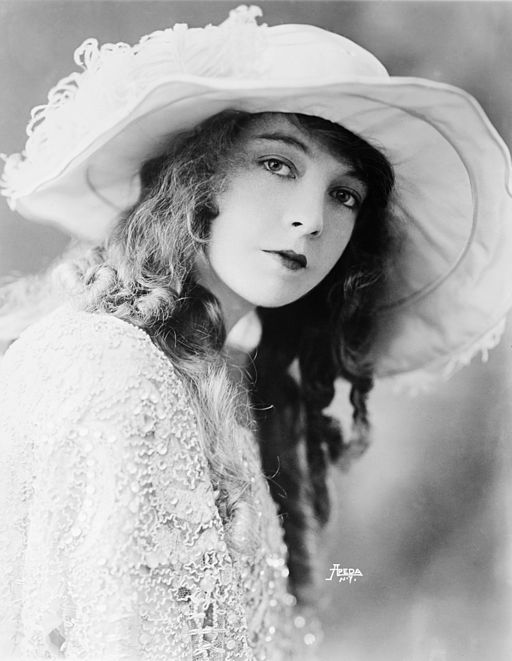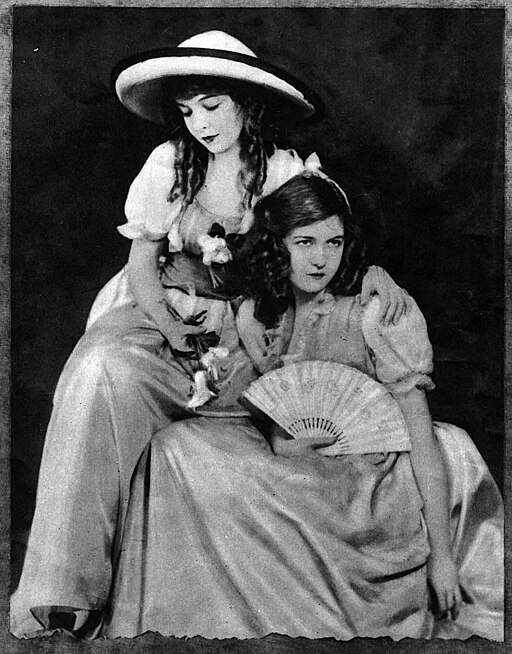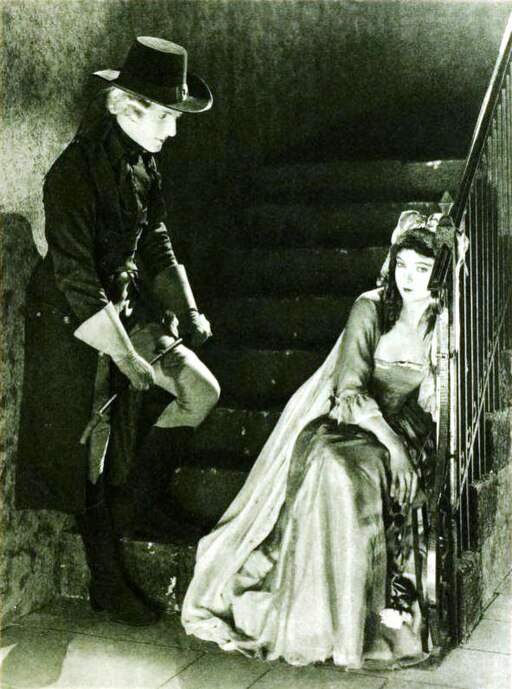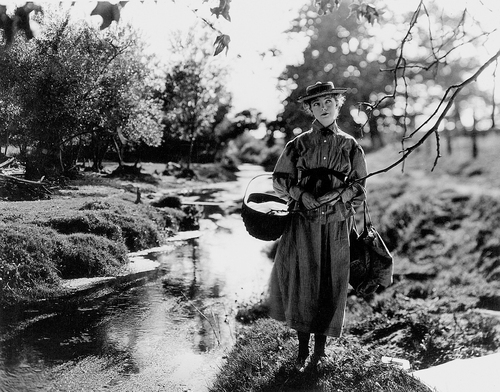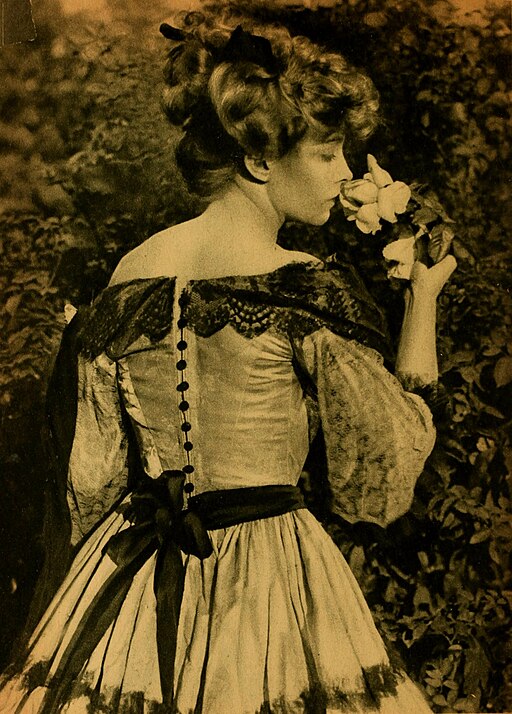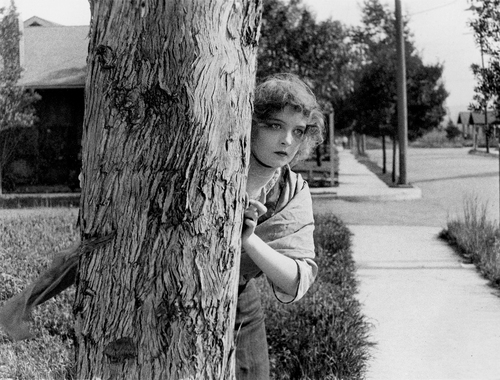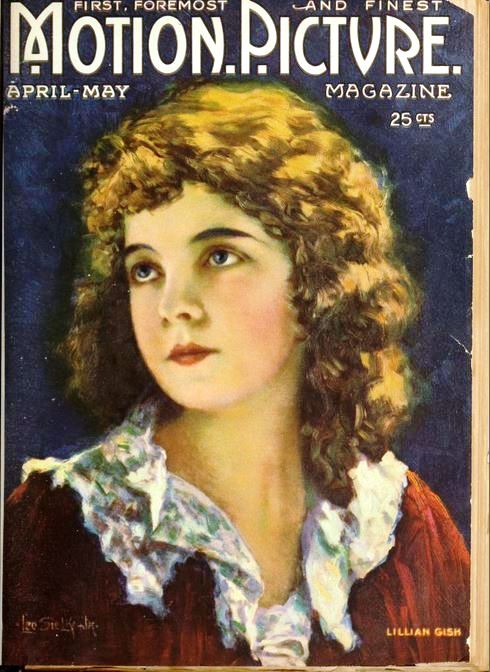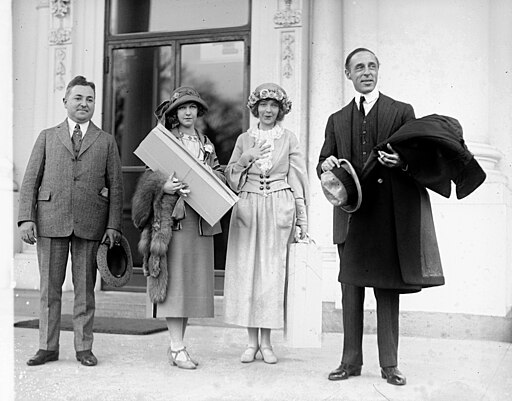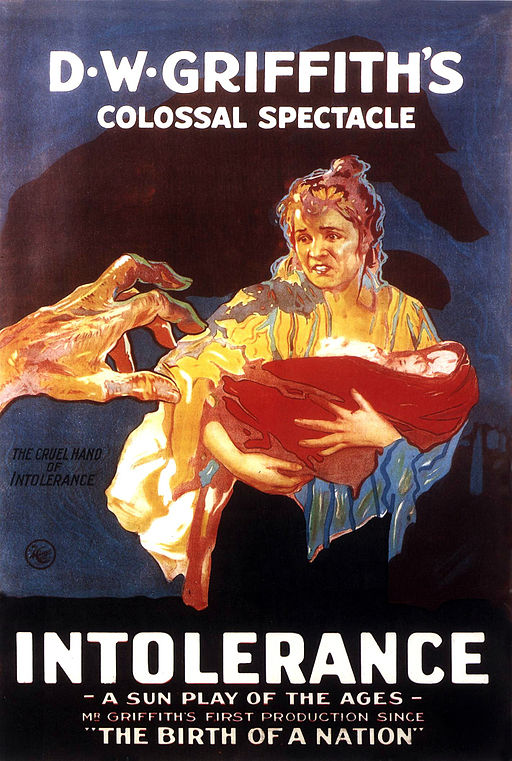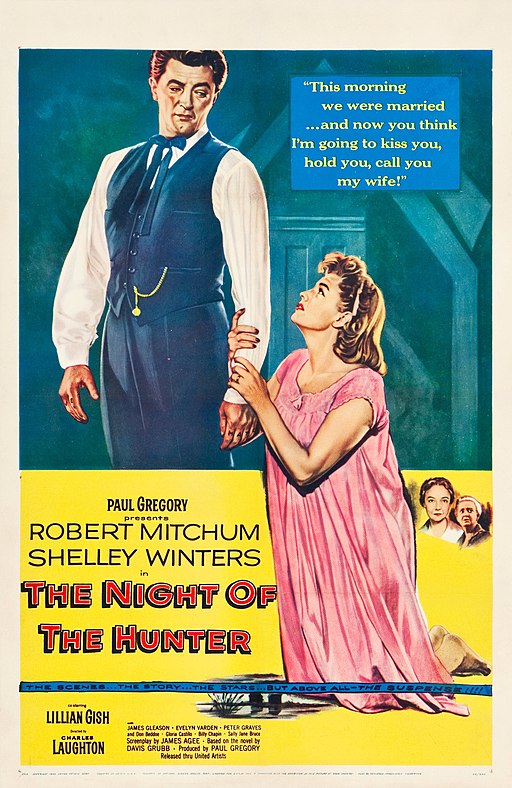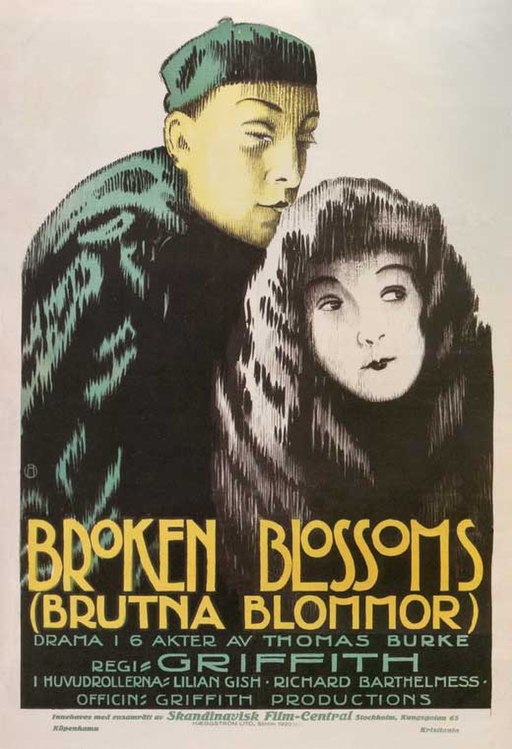Lillian Gish
back| Full Name | Lillian Diana Gish |
| Stage Name | Lillian Gish |
| Born | October 14, 1893 |
| Birthplace | Springfield, Ohio, USA |
| Died | February 27, 1993 |
| Buried | Saint Bartholomew's Episcopal Church, New York City, NY, USA |
| Married to | Never married |
| Children | None |
| Notable films | The Birth of a Nation (1915) - Intolerance (1916) - Broken Blossoms (1919) - Dwon East (1920) - The WInd (1928) - Duel in the Sun (1946) |
Lillian Gish
First Lady of American Cinema
Lillian Gish, born on October 14, 1893, in Springfield, Ohio, was a seminal figure in cinema, whose career spanned over seven decades. Starting in silent film as D.W. Griffith's muse, she became known as the "First Lady of American Cinema." Gish's ethereal presence and emotive depth transformed acting for the screen.
Her early work included pivotal roles in "The Birth of a Nation" (1915) and "Intolerance" (1916), where she displayed an extraordinary capacity for conveying complex emotions without dialogue.
In "Broken Blossoms" (1919) and "Way Down East" (1920), Gish solidified her status as a silent film icon, mastering the art of subtle, nuanced performance. She adeptly transitioned to sound films, continuing to deliver compelling performances, notably in "Duel in the Sun" (1946) and "The Night of the Hunter" (1955).
Gish's enduring legacy is not only in her groundbreaking work in early cinema but also in her advocacy for film preservation and recognition as an art form. She remained active in film and television into her nineties, earning an Honorary Academy Award in 1971 for her contributions to cinema. Lillian Gish passed away on February 27, 1993, leaving behind a legacy as one of the most influential figures in the history of film.
Related
Lillian Gish
Biography and Analysis of her Acting Career
Early Life
Lillian Gish was born in Springfield, Ohio, to Mary Robinson McConnell and James Leigh Gish. Her childhood was marked by instability and financial struggles after her father abandoned the family. Gish began her acting career in local theater productions to help support her family.
Career Beginnings
Gish entered films in 1912 after meeting director D.W. Griffith. She quickly became a key figure in Griffith’s stock company, starring in numerous silent films and becoming one of the era’s most revered actresses.
Silent Film Stardom
Her performances in "The Birth of a Nation" (1915) and "Intolerance" (1916) showcased her talent for emotional depth and dramatic expression. Gish became known for her ethereal presence and ability to convey subtle emotions, earning her the nickname "The First Lady of American Cinema."
Transition to Sound Films and Later Career
Gish successfully transitioned to sound films, although she worked less frequently in the new medium. She returned to the stage and also appeared in television and film roles into the 1980s, including notable performances in "Duel in the Sun" (1946) and "The Night of the Hunter" (1955).
Personal Life
Gish never married, dedicating her life to her career and caring for her mother and sister, actress Dorothy Gish. She was known for her professionalism, discipline, and dedication to the art of acting.
Legacy and Death
Gish passed away in 1993 at the age of 99. Her career spanned 75 years and over 100 films. She is remembered as a pioneer of cinema, contributing significantly to the development of film acting techniques. Her legacy is honored with a star on the Hollywood Walk of Fame, and she remains a symbol of the silent film era and its enduring impact on the film industry.
Notable movies featuring Lilian Gish:
1912:
"An Unseen Enemy": Gish's film debut, where she and her sister Dorothy are pursued by a mysterious burglar.
1915:
"The Birth of a Nation": A landmark film in cinema history, Gish plays Elsie, caught in the turmoil of the American Civil War.
1916:
"Intolerance": In this epic film, she appears in the modern story, portraying the struggles of a young mother.
1919:
"Broken Blossoms": Gish stars as Lucy, a vulnerable girl abused by her father and protected by a Chinese immigrant.
1920:
"Way Down East": Gish plays Anna, a country girl deceived and abandoned by a wealthy playboy.
1921:
"Orphans of the Storm": Alongside her sister Dorothy, Gish plays a woman caught up in the French Revolution.
1926:
"La Bohème": Gish stars as Mimi, a seamstress in a tragic romantic drama based on the opera.
1928:
"The Wind": One of her most celebrated silent roles, Gish plays a woman facing the harsh conditions of the Texas desert.
1946:
"Duel in the Sun": Gish plays the role of Laura Belle McCanles in a Western drama.
1955:
"The Night of the Hunter": Gish plays Rachel Cooper, a tough and kind woman who protects children from a murderous preacher.
1967:
"The Comedians": Gish appears in a supporting role in this drama set in Haiti.
1987:
"The Whales of August": One of her final roles, Gish stars alongside Bette Davis as one of two elderly sisters reflecting on their lives.
Analysis of the Acting Style of Lillian Gish:
Lillian Gish, renowned for her work during the silent film era and beyond, had an acting style that was both pioneering and influential. Her performances were characterized by a combination of subtlety, emotional depth, and expressive physicality, which contributed significantly to the development of film as an expressive art form. Here is an analysis of her acting style:
Emotional Expressiveness
Gish's ability to convey complex emotions without words was central to her effectiveness as a silent film actress. She utilized subtle facial expressions, gestures, and body language to communicate her characters' innermost feelings, thoughts, and motivations.
Physicality and Gestures
In the absence of dialogue, Gish's physical movements and gestures were crucial in storytelling. She was adept at using her entire body to express a range of emotions, from joy and innocence to despair and fear.
Innate Vulnerability
Gish often portrayed vulnerable, innocent characters who endured hardship and tragedy. Her natural vulnerability on screen evoked empathy and emotional engagement from the audience, making her performances memorable and impactful.
Evolution with the Medium
As film technology and techniques evolved, so did Gish's acting style. She successfully transitioned from the melodramatic style typical of early silent films to more naturalistic performances in later sound films, showcasing her versatility and adaptability as an actress.
Strength and Resilience
Despite often playing delicate, ethereal characters, Gish brought a sense of strength and resilience to her roles. This complexity added depth to her characters and set her apart from other actresses of her time.
Artistic Collaboration
Gish's work with director D.W. Griffith was particularly influential. Under Griffith's direction, she honed her craft and contributed to some of the era's most significant films. Their collaboration was marked by a mutual understanding of the cinematic medium and its potential for emotional storytelling.
Lillian Gish’s Successful Transition from Silent to Sound Movies:
Lillian Gish's transition from silent to sound films is notable for its success at a time when many silent film stars struggled to adapt to the new medium. Her successful transition is attributed to several factors:
Versatile Acting Skills
Unlike many silent film actors whose overly expressive styles didn't translate well to sound films, Gish's acting was nuanced and adaptable. Her performances, even in silent films, were marked by a subtlety that transitioned effectively to the sound era.
Voice and Diction
Gish had a clear, well-modulated voice, which was crucial for the sound era. She spoke with clarity and expressiveness, avoiding the pitfalls that befell many silent film actors who had unappealing voices or poor diction.
Selective Role Choices
Gish was selective about her roles in sound films, choosing parts that suited her acting style and resonated with audiences. This careful selection helped her maintain a consistent screen presence.
Continued Collaboration with Top Directors
Her continued work with renowned directors in the sound era, such as D.W. Griffith, ensured that she was involved in quality productions that highlighted her strengths as an actress.
Theater Experience
Gish's experience on stage also played a role in her successful transition. Theater acting required a different set of skills than silent film acting, and this experience helped her adapt to sound films, where dialogue and vocal expression were crucial.
Staying Relevant
Gish continued to evolve with the industry, taking roles in both films and later in television, which demonstrated her willingness to adapt to changing times and mediums.
Remarkable Quotes from Lillian Gish:
On the Art of Acting:
"You can get through life with bad manners, but it's easier with good manners."
Regarding Silent Film Acting:
"The older I get, the more I believe in what I can't explain or understand, even more than the things that are explainable and understandable."
On Her Career Longevity:
"I've never been in style, so I can never go out of style."
Reflecting on Film's Influence:
"Art can only be truly art by presenting an adequate outward symbol of some fact in the interior life."
About D.W. Griffith:
"Mr. Griffith was the only director who ever influenced me, and I have never had a rapport with any other director like the one I had with him."
On Life and Work:
"A happy life is one spent in learning, earning, and yearning."
Her View on Life:
"What you get is a living, what you give is a life."
Awards and Nominations:
Academy Awards:
- While Gish never won a competitive Oscar, she was awarded an Honorary Academy Award in 1971. This award was given to her "for superlative artistry and for distinguished contribution to the progress of motion pictures."
Other Honors and Lifetime Achievements:
- Kennedy Center Honors: In 1982, Lillian Gish was a recipient of the Kennedy Center Honors, an annual honor for career achievements and contributions to American culture.
- American Film Institute: In 1984, Gish received the AFI Life Achievement Award, a high honor for a career in film.
- George Eastman House: She was awarded the George Eastman Award in 1955, given for distinguished contribution to the art of film.
- National Board of Review: Gish received the Career Achievement Award from the National Board of Review in 1980.
Film Festivals:
- Gish was often celebrated at film festivals for her contributions to cinema. Various retrospectives of her work were held, highlighting her significant impact on the industry.
Analysis of Lilian Gish’s Performance in the Movie “The Wind”:
Lillian Gish's performance in "The Wind" (1928), directed by Victor Sjöström, is widely regarded as one of her most powerful and enduring roles. This silent film, set in the harsh, desolate Texas prairie, showcases Gish's remarkable ability to convey deep emotion and psychological turmoil. Here is an analysis of her performance in the film:
Physical and Emotional Demands of the Role
Gish played Letty Mason, a fragile and innocent Virginia woman who moves to the Texas plains, only to be overwhelmed by the harsh environment and cultural isolation. The role was physically and emotionally demanding, requiring Gish to portray a gradual descent into madness driven by the relentless wind and her personal tragedies.
Expressive Silent Film Acting
Without the aid of dialogue, Gish's performance relied on her ability to express complex emotions through facial expressions, body language, and eyes. She conveyed Letty's fear, desperation, loneliness, and eventual mental breakdown with poignant clarity.
Innovative Acting Techniques
Gish's performance was ahead of its time in its psychological depth. She used subtle gestures and nuanced expressions to portray Letty’s inner struggle, bringing a modern sensibility to silent film acting.
Endurance and Commitment
The filming conditions were extremely challenging, with powerful wind machines constantly blowing sand and dirt. Gish's endurance and commitment to the role were evident in her ability to perform under these conditions, adding authenticity to her portrayal of Letty's struggle against the elements.
Collaboration with Victor Sjöström
Under Sjöström's direction, Gish delivered a nuanced performance that complemented the film's visual style and narrative. Her ability to convey the inner life of her character added a psychological complexity that was unusual for films of that era.
Legacy of the Performance
"The Wind" is considered a masterpiece of silent cinema, largely due to Gish's compelling performance. Her portrayal of Letty Mason stands as a testament to her skill as an actress and her understanding of the medium's power to convey deep emotional and psychological experiences.
In summary, Lillian Gish's performance in "The Wind" is a masterclass in silent film acting, marked by emotional depth, physical expressiveness, and psychological complexity. It remains one of her most critically acclaimed roles and a significant contribution to the art of cinema.
Full list of movies featuring Lillian Gish:
1912:
- An Unseen Enemy
- Two Daughters of Eve
- So Near, Yet So Far
1913:
- The Mothering Heart
- The Battle at Elderbush Gulch
1914:
- Judith of Bethulia
- The Birth of a Nation
1915:
- Home, Sweet Home
- Enoch Arden
1916:
- Intolerance
- Diane of the Follies
1917:
- Souls Triumphant
1918:
- The Great Love
- Hearts of the World
1919:
- A Romance of Happy Valley
- Broken Blossoms
- True Heart Susie
1920:
- Way Down East
1921:
- Orphans of the Storm
1923:
- The White Sister
1924:
- Romola
1926:
- La Bohème
1927:
- The Scarlet Letter
1928:
- The Wind
1930:
- One Romantic Night
1933:
- His Double Life
1942:
- Commandos Strike at Dawn
1943:
- Top Man
1944:
- Since You Went Away
1946:
- Miss Susie Slagle's
- Duel in the Sun
1947:
- The Woman I Love
1948:
- Portrait of Jennie
1955:
- The Night of the Hunter
- The Cobweb
1958:
- Orders to Kill
1960:
- The Unforgiven
1966:
- Follow Me, Boys!
1967:
- Warning Shot
- The Comedians
1971:
- The Last Picture Show
1987:
- The Whales of August

